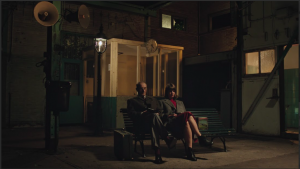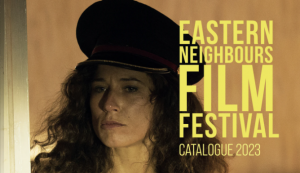
{{ newsTitle }} {{ newsVisible ? '✦' : '✧'}}
- New Talents Open CallEastern Neighbours Film Festival (ENFF) began in The Netherlands in 2008 with the idea to offer Dutch and international audiences a unique glimpse into the cinema of their neighbors from Eastern and Southern Europe. This annual event presents the most recent, exciting, and thought‐provoking films, from countries with small, but often powerful film industries, that… Read more: New Talents Open Call
- ENFF 2023 On Demand!Unable To attend the festival in person? No problem! From November 27th to December 3rd, we’re thrilled to bring you a curated selection of this year’s films available for online viewing! Catch our captivating Opening Film Ivan’s Land, or the touching Closing Film Seventh Heaven. Or explore a collection of shorts from the New Talents Competition! Follow along… Read more: ENFF 2023 On Demand!
- What’s up in Slovak Cinema? A conversation with Monika LostakovaWe talked with Monika Lošťáková about contemporary Slovak cinema.
- ENFF and the Eastern European Film Festival Network!The Eastern European Film Festival Network brings together five film festivals dedicated to promoting and showcasing Eastern European cinema, alongside one partner organisation.
- MasterclassesThrough these masterclasses we approach two memory in film from different angles: memories from a personal or collective recollection through archive material.
- Work in ProgressIn Work in Progress, emerging filmmakers and artists will present their works in development to the audience and engage in discussions with Dutch experts.
- Festival Timetable Available!
- Check out the catalogue for our 2023 edition!
- Music at ENFFEvery year, ENFF brings special musical guests who bring beauty to the program and further represent the rich cultures of their countries to a Dutch audience.
- Film MarathonJoin us for the Film Marathon, a new concept in which we merge two components, Short Films, Big Stories, and New Talents Competition into a whole-day screening of short films!
A re-imagining of the medieval Serbian epic poem “Banovich Strahinya” in which contemporary African migrants take the place of Serbian national heroes. Winner of dozens awards, including Grand Prix and Europa Cinemas Label at Karlovy Vary for outstanding cinematography, appealing performances and the excellent presentation of one of the most defining problems of our times – migration.
Synopsis
Identity, tradition and love are at the core of this intriguing film which provides a moving portrait of a couple struggling during the migrant crisis. Strahinya and his wife, Ababuo, both 28, left Ghana and against all odds they managed to reach Germany, but were deported back to Belgrade. Serbia may not be Germany, but Strahinya does his best to start a new life while Ababuo, a passionate woman aspiring to become an actress in London, feels unfulfilled in life. The question is whether they can survive as a couple as one night the temptation emerges to top all the bureaucratic hardship and poverty.
STRAHINJA BANOVIC
Serbia, France, Luxembourg, Bulgaria, Lithuania | 2021 | 92 min
DIRECTOR: Stefan Arsenijevic
PRODUCTION: Miroslav Mogorovic – Art & Popcorn; Les Films Fauves; Surprise Alley; Chouchkov Brothers, Artbox
CAST: Ibrahim Koma, Nancy Mensah-Offei, Maxim Khalil, Rami Farah, Nebojsa Dugalic
SCREENPLAY: Stefan Arsenijevic, Bojan Vuletic, Nicolas Ducray
CINEMATOGRAPHY: Jelena Stankovic
EDITING: Vanja Kovacevic
SCREENING: Saturday 26.11. / 21:30h / Zaal 2 & Sunday 27.11. / 13:00h / Zaal 5
DUTCH PREMIERE
The screening will be followed by Q&A with co-writer Bojan Vuletic.
Festivals & Awards (selection)
Karlovy Vary IFF, 2021 – Grand Prix, Award of Ecumenical Jury, Europa Cinemas Label Award, Best Actor, Crystal Globe | Trieste FF, 2022 – Best Film | SEEfest, Los Angeles 2022 – Audience Award, Best Feature Film, Honorable Mention, Tech Prize | Palic FF, 2022 – Best Domestic Film | GoEast, Wiesbaden 2022 – Special Mention
Director’s statement
At the heart of our film is something very intimate. A love story. A stubborn, unusual and beautiful love story. The story of a man who goes against society’s rules and risks everything he has for love. My hometown of Belgrade was one of the hot spots on the so-called Balkan migrant route. Every day thousands of refugees would reach Serbia in what was considered the biggest refugee crisis since the Second World War. It was emotional to see these lost and exhausted people wandering around town. Some poor, some even wealthy, but most of them middle class, educated and urban. People like me. Some numb and quiet, others full of adrenaline, tense and restless. But what they all had in common was the fear of what would happen next. At the same time, I was considering making a modern interpretation of one of the most important traditional Serbian epics, the medieval poem “Strahinja Banović”. It occurred to me: what if the Serbian national hero was a young African migrant in the new adaptation? What kind of impact would this have on our understanding of national heritage and identity? With truly wonderful and dedicated actors and crew, we were determined to connect two quite different worlds: a traditional Serb and a modern migrant with the hope of gaining a new and deeper understanding of both.
Director’s bio
Writer/director Stefan Arsenijevic was born in Belgrade (Serbia) in 1977. He graduated in Film and TV Directing from the Faculty of Dramatic Arts in Belgrade, where he now teaches film directing at the Master’s studies. His short film “(A)torsion” (2003) won over 30 national and international awards, including the Golden Bear at the Berlinale, the European Film Academy Award, and the Oscar nomination. He directed a short film in omnibus “Lost and Found” (the opening film of the Berlinale Forum 2005). His first feature film “Love and Other Crimes” premiered at the Berlinale Panorama Special in 2008 and won several international awards. With director Bojan Vuletic, he co-wrote “Practical Guide to Belgrade with Singing and Crying” (Karlovy Vary IFF 2011). His second feature film “As Far as I Can Walk” premiered at the Crystal Globe Competition of Karlovy Vary IFF 2021 winning 5 awards including the Grand Prix for the Best film. So far, the film has participated in more than 40 international film festivals winning 17 more awards. Stefan has been a Program Manager of the Goethe Institutes’ professional training program for Southeast European film directors FIRST FILMS FIRST since 2015. He has also been a Member of the European Film Academy since 2003.









